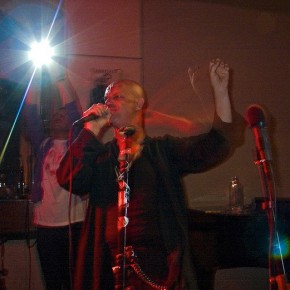Last May, I posted piece on the publication of the Schwarze Hefte, the heretofore unpublished notebooks kept by the prominent German philosopher Martin Heidegger. This event was getting a lot of press at the time, much more so than the emergence of unpublished works by a thinker few people have read and even fewer understand would usually do.
But the whiff of scandal is one of the few things capable of arousing generalized interest in philosophy, and these new Heideggerian texts had more than a little of it.
They were, claimed many of Heidegger’s detractors (and a broad selection of other kibitzers) final proof of his anti-Semitic beliefs. To many among the chattering classes, this was the last nail in the coffin of Heidegger’s reputation.
Of course it was not. Putting aside the fact that Heidegger’s anti-Jewish prejudices were well known both in the 1930s and after the war, and that the supposed “rediscovery” of this issue with the outbreak of the controversy (mostly in France) after the publication of Victor Farías’ Heidegger and Nazism (1987/1991), the question of Heidegger’s racist views was and remains only one part of his scholarly reputation. Even without the revelations about his lurid views on race, Heidegger has always been a divisive figure.
The abstruse quality of his writing, which only got worse with time, and his tendency to coin neologisms and to use common philosophical terms (like being) in extremely non-traditional ways made him a hate figure to many, particularly among those working in the analytic tradition. For them, Heidegger was merely playing meaningless games with language, games which obfuscated without clarifying important questions. He was (and is) for many in that region of scholarship a pseudo-philosopher and a charlatan. The fact that he was also an anti-Semite was simply grist for a mill that was already quite active.
All of this was old news when the publication of the Schwarze Hefte commenced with the release of volume 94 of Heidegger’s collected works under the editorship of Wuppertal philosopher Peter Trawny. While that volume (which contained entries from 1933 to 1938) contained little of direct relevance to the question, volumes 95 and 96, dating from 1938 to 1941 contains more overtly damning material. There, not for the first time in Heidegger’s scholarly works, but certainly with greater depth and intensity, we find talk of “the Jews” (the collective designation itself evidence of the malign views on offer) and their influence on the civilization of the West.
The publication of these new volumes and the grim evidence contained therein coincided with the release of an updated version of Trawny’s Heidegger und der Mythos der jüdischen Weltverschwörung (Heidegger and the Myth of the Jewish World Conspiracy.) This is indeed a timely occurrence, as Trawny is one of the most measured and (as editor of the later volume of the Gesamtausgabe) best-informed commentators on the subject. The title of the book is something of a misnomer, at least in the sense that the topic that Trawny takes as his brief is really the full scope of Heidegger’s attitudes toward Jews and Judaism, as they relate to the material in the Schwarze Hefte.

Before digging into Trawny’s book, it might be useful to talk about the ways that scholarly projects can be influenced by (or contaminated with) anti-Semitic ideas. Speaking here of figures who verifiably hold anti-Semitic views, there is a gamut of influence running from what one might (in the context of philosophical thought) refer to as passive anti-Semitism, to a fully active variety. At one end we have someone like Gottlob Frege. Frege’s journals contain fond remembrances of the time when Jews could only enter Wismar on market days and were all compelled to leave when the ending bell rang.
In tone and temperament, this attitude is commensurate with those towards Jews that were common among the educated classes in Germany and across Europe. Repugnant as it is, one would be hard pressed to find the slightest trace of it in Frege’s work, the positivistic approach of which tended to exclude expressions of social value. At the other end of the spectrum is someone like Alfred Rosenberg. If one subtracts the anti-Semitism from his The Myth of the Twentieth Century, one is left with disconnected, atavistic natterings about industrial society amounting to very little.
Heidegger, as is clear from Trawny’s book, began towards one end of the spectrum and then moved to the other. His scholarly writings from the 1920s do not reflect a specifically racialist agenda. There are extant letters to his wife, Elfriede, in which he, for instance, complains of the present of the town being full of “Jews and profiteers” on market day. This is, in essence, comparable with Frege’s views and represents a version of the low-grade, ambient anti-Semitism common in early 20th century European culture. But, as Trawny shows effectively, Heidegger’s views changed over time, becoming more intense in the wake of the Nazi Machtergreifung, and more intense still with approach of war in the late 1930s.
The early years of the decade were a heady time for Heidegger. Having come out of the shadow of his mentor Husserl with the publication of Being and Time in 1927, Heidegger had become one of the brightest spots in the German intellectual firmament by the time of the rise of Hitler. Heidegger saw in National Socialism the chance for a revolution that would sweep away the dross of modern culture and create space for a more authentic engagement with the history of being. Readers of Hugo Ott’s exemplary Martin Heidegger: Unterwegs zu seiner Biographie (1988) will know the main points of what followed.
Heidegger’s appointment as the rector of Freiburg University, his participation in the process of Gleichschaltung that saw Jewish professors pushed out of their positions, his founding of a camp for student labor service outside of the town, the singing of the odious Horst Wessel Lied at faculty meetings, to hit only the main points. His Rectoral Address set the tone, politicizing the work of the university in such a way that, as the sociologist Pierre Bourdieu would later write, “at the end of the lecture the listener does not know whether to turn to read Diels on ‘the pre-Socratics’ or join the S.A.”
In his first course in the new era, Heidegger limited himself to discussions of the great tasks facing German academic youth. But in a session in 1934, we find Heidegger speaking of the inability of “Semitic nomads” to properly understand German spaces. Yet it is also true that his enthusiasm for actually existing Nazism would soon wane. In the notes from the period between 1933 and 1938 (the structure of the notebooks makes it impossible to ascertain exactly when) we find Heidegger complaining of “vulgar national socialism,” seeking thereby to differentiate it from the true movement whose “inner truth and greatness” he would still associate himself with in the 1950s.

Trawny’s book shows a trajectory in Heidegger’s anti-Semitism that jibes with the changes in the historical context. In the mid-1930s, with his love affair with the Hitler regime fading, Heidegger began what he would later term “the turning” (die Kehre) away from the project of fundamental ontology that he had pursued in the 1920s and towards a more essential, non-metaphysical engagement with being (now rendered archaically a Seyn in preference to the more modern Sein.) This new “being historical” approach included a more extensive attempt to characterize how things had gone wrong in Western culture. His critique focused on technology and the influence of empty rationalism.
Western culture had become fascinated with “the gigantic” (das Riesige) as part of the process of technological framing (to use a term that he only employed later) of human existence. Moreover, the structure of human societies was suffused with Machenschaft, a term that doesn’t translate perfectly but indicates scheming, intriguing, and dealing but in a way that is culturally associated with the suffusion of Western culture with the values of rationalistic capitalism. It is here that we find Heidegger’s philosophy engaging with the traditional anti-Semitic canards, familiar to anyone who has had the misfortune of reading The Protocols of the Learned Elders of Zion, which sees these tendencies as the outgrowths of an organized Jewish conspiracy meant to lead to world domination.
There is a point in Karl Jaspers’ intellectual autobiography at which he relates a conversation with Heidegger about The Protocols. Jaspers evinced shock that anyone could give credence to such “malignant nonsense,” to which Heidegger responded by asserting the existence of “a dangerous international alliance of Jews.” It is highly unlikely that Heidegger ever read The Protocols himself, but this exchange seems to suggest that he viewed them as an expression (admittedly base and exaggerated) of a truth in the world. Trawny’s presentation of the progression Heidegger’s view into the later 1930’s shows a distinct intensification as “the Jews” are ever more explicitly tied to more immediate forces destroying Western culture: Americanism, British colonialism, and Bolshevism.
While excellent in most respects, Trawny’s account does have some problematic elements. After earlier asserting that Heidegger’s antisemitic views differed from Nazi racial thought, he later suggests that there was an element of biologism in them nonetheless. His arguments for this are not totally convincing. Similarly, after correctly noting that Heidegger’s criticism in the mid-1930s of Edmund Husserl’s philosophy as evincing an “empty rationalism” had distinctly anti-Semitic overtones, he then suggests that it is possible that Heidegger’s break with his erstwhile mentor might also have had an anti-Semitic dimension.
This seems to overreach the available facts. Heidegger had clearly broken with Husserl’s approach to phenomenology by 1926 at the latest. The precursors of this break can been even earlier, as for instance in Heidegger’s critiques of academic philosophy in his lecture course delivered at Freiburg in the summer of 1923 (published under the title Ontology – The Hermeneutics of Facticity.) In any case, there is more than enough material to explain the growing tension between Husserl and Heidegger without reading Heidegger’s mindset in the mid-1930s a decade backwards.
Still, taken as a whole Trawny’s book provides the most coherent and convincing presentation of the totality of Heidegger’s views on Jews and the ways that these changed in the context of the radicalization of National Socialism in the later 1930s. This certainly doesn’t amount to a defense (much less an exoneration) of Heidegger against the charge of having espoused ridiculous and indefensible views, or of having thrown his lot in with a brutal and deeply anti-intellectual cabal in the name of somehow saving Western culture. What it does do is provide the best avenue yet for understanding how someone who was clearly extremely intelligent could associate himself with views that were so stupid.

The last couple of months have seen some interesting further turns. In January, the Freiburg professor Günter Figal resigned as chairman of the Martin Heidegger Society, citing the revelations from the Schwarze Hefte:
As chairman of a society, which is named after a person, one is in a certain way a representative of that person. After reading the Schwarze Hefte, especially the anti -Semitic passages, I do not wish to be such a representative any longer. These statements have not only shocked me, but have turned me around to such an extent that it has become difficult to be a co-representative of this.
Although the material contained in the Schwarze Hefte is new terms of volume and intensity rather than in kind, one can easily understand how one might now want to be president of the fan club of someone hateful and naïve enough to emit them.
A further twist came in an article written by the Italian philosopher Donatella Di Cesare. Di Cesare is one of the few scholars (besides Trawny himself) who has had access to volume 97 of the Gesamtausgabe, comprising notebooks from the postwar period. There we find Heidegger in full misdirection mode, offering the suggestion (equally vile and risible) that the Holocaust was a matter of the Jews “self-destructing”.
Although this material has yet to be published. there is every reason to think that Di Cesare’s statements are correct, both because of the fact that she is a very reputable scholar, and because the assertion itself is not all that different than Heidegger’s comparison (in a letter to Herbert Marcuse just after the war) of the mass killings in the Holocaust to the spread of mechanized agriculture. This all seems perfectly commensurate with known facts about Heidegger’s personality: his anti-Semitic views thoroughly leavened with personal vanity, leading to an inability to admit manifest errors that drove him ever deeper into the defense of the utterly indefensible.
Heidegger’s philosophy represents perhaps the greatest challenge to Western thought, both in terms of the critical questions that it asks of the Cartesianism that underlies it, but also because of its contamination with a mode of thinking utterly antithetical to the civilized and civilizing aspects of philosophy. As Hubert Dreyfus and others have shown, it is possible to read the elements of Heidegger’s work not polluted with racism as a viable critical project, and it is worth noting that rigorous and systematic intellectual historical analyses of the project as a whole (such as that provided by Trawny’s work) can provide readers with at least some guidance as to how this is to be undertaken.
Yet, it is nonetheless clear that Heidegger’s embrace of repulsive and utterly groundless anti-Jewish views raises important questions about the nostrums of philosophy.
The horrors of the 20th century have made us justly suspicious of the Whiggish proposition that excellence constitute excellence in totality. Martin Heidegger presents perhaps the starkest example of the coexistence in one psyche of the sublime and the ridiculous. If the continuing stream of revelations about Heidegger’s credulity, his arrogance, and his manifest failure to rationally examine his own political views has the effect of putting civilized people off him, then it must be said that he has only himself to blame.
Photographs courtesy of Wally Gobetz, faeanna, Cary-Bass Deschenes and Glenn Thomas Franco Simmons. Published under a Creative Commons license.





